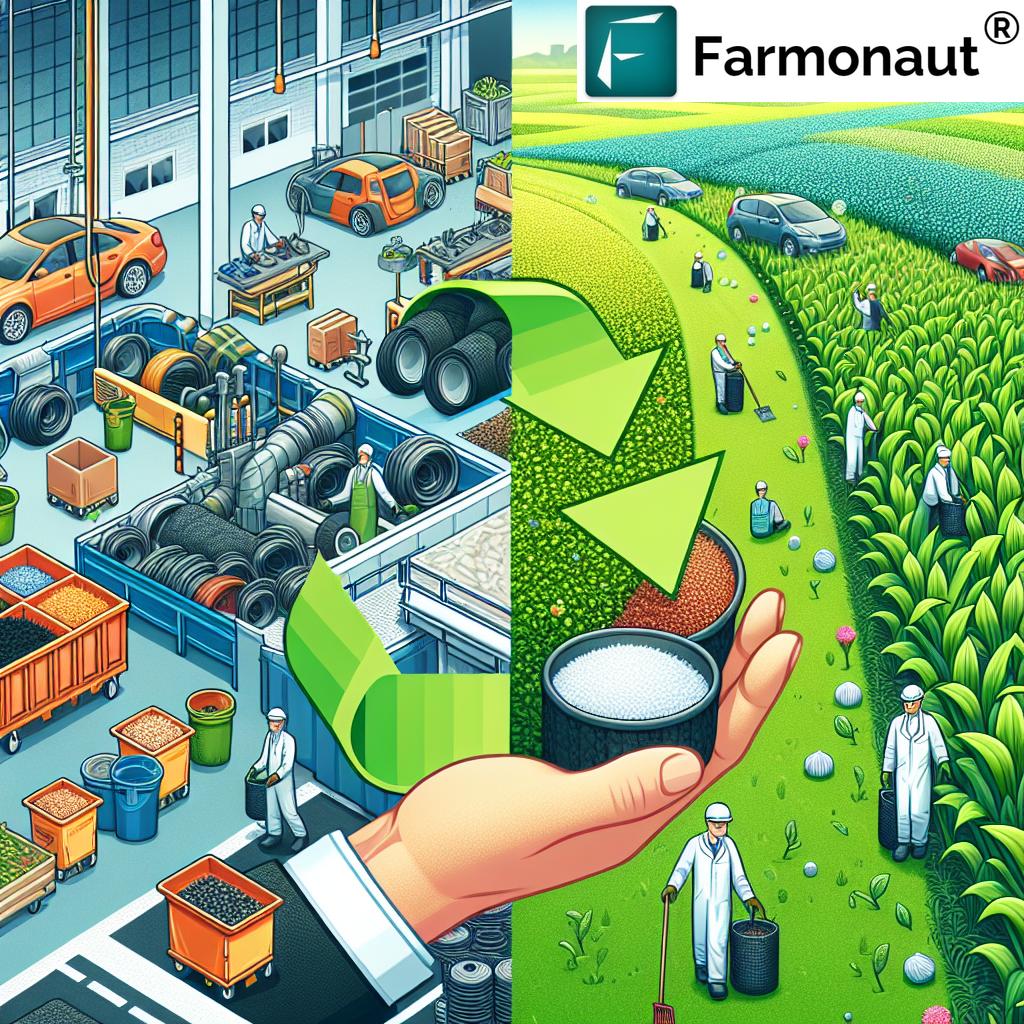Revolutionizing Automotive Sustainability: Pangea’s Breakthrough Zero-Waste Leather Shavings Transform into Eco-Friendly Fertilizers

In a groundbreaking move that’s set to reshape the automotive industry’s approach to sustainability, Pangea has unveiled a revolutionary process that transforms zero-waste leather shavings into eco-friendly fertilizers. This innovative leap forward not only addresses the pressing issue of leather waste in automotive manufacturing but also paves the way for a more circular economy in the sector.
The Dawn of Zero-Waste Leather Production
Pangea, a frontrunner in sustainable automotive materials, has set an ambitious goal to achieve complete waste elimination at their Leon manufacturing site by 2024. The company has already made significant strides, repurposing nearly 2,000 metric tons of leather shavings that would have otherwise ended up in landfills.
This initiative is a prime example of automotive sustainability innovations that are desperately needed in an industry often criticized for its environmental impact. By implementing zero-waste leather production techniques, Pangea is not just reducing waste but creating value from what was once considered a disposable byproduct.
From Waste to Resource: The Circular Economy in Action
The cornerstone of Pangea’s breakthrough lies in its approach to leather waste recycling. Instead of viewing leather shavings as waste, the company has reimagined them as a valuable resource. This shift in perspective is at the heart of the circular economy in automotive industry practices that are gaining traction globally.
- Waste Reduction: By repurposing leather shavings, Pangea significantly reduces the amount of waste sent to landfills.
- Resource Efficiency: The process maximizes the use of raw materials, ensuring that every part of the leather is utilized.
- Environmental Impact: Converting waste into useful products reduces the overall environmental footprint of automotive manufacturing.
For those interested in exploring more sustainable agricultural practices, Farmonaut’s app offers valuable insights and tools.

Biostimulant Fertilizers: A Green Revolution
The innovative process developed by Pangea transforms leather shavings into biostimulant fertilizers, creating a win-win situation for both the automotive and agricultural sectors. These eco-friendly fertilizers from leather waste offer several advantages:
- Enhanced Soil Health: Biostimulants improve soil structure and fertility.
- Increased Crop Yield: Plants treated with these fertilizers often show improved growth and productivity.
- Reduced Chemical Dependence: The use of organic biostimulants can decrease reliance on synthetic fertilizers.
This breakthrough in biostimulant manufacturing from leather waste exemplifies the potential of waste-to-resource conversion in creating sustainable solutions across industries.

Green Manufacturing in the Automotive Sector
Pangea’s commitment to green manufacturing practices was highlighted during their recent “Chart the Path” presentation. The company emphasized the importance of closing the loop in leather production, setting a new standard for sustainable leather production in the automotive industry.
Key aspects of Pangea’s green manufacturing approach include:
- Energy Efficiency: Implementing processes that minimize energy consumption.
- Water Conservation: Developing techniques that reduce water usage in leather production.
- Emission Reduction: Adopting technologies that lower greenhouse gas emissions.
For those interested in exploring sustainable agricultural technologies, Farmonaut’s API offers valuable data and insights.
The Impact on Automotive Sustainability
Pangea’s zero-waste initiative is more than just an environmental win; it’s a blueprint for automotive sustainability that could reshape the entire industry. By demonstrating that sustainable leather shavings recycling is not only possible but profitable, Pangea is challenging other manufacturers to rethink their approach to waste management.
The ripple effects of this innovation could include:
- Increased adoption of circular economy practices across the automotive supply chain.
- Development of new technologies for repurposing other types of automotive waste.
- Greater collaboration between the automotive and agricultural sectors.
Developers interested in integrating sustainable agricultural data into their projects can refer to the Farmonaut API Developer Docs.
Challenges and Future Prospects
While Pangea’s breakthrough is undoubtedly promising, scaling this technology across the industry presents several challenges:
- Infrastructure Development: Establishing the necessary facilities for large-scale biostimulant production from leather waste.
- Quality Control: Ensuring consistent quality of the fertilizers produced from varying leather waste sources.
- Market Acceptance: Educating farmers and agricultural businesses about the benefits of these new biostimulants.
Despite these challenges, the potential for growth and innovation in this field is immense. As more automotive companies adopt zero-waste leather production practices, we can expect to see:
- Emergence of new eco-friendly materials derived from automotive waste.
- Increased research into novel applications for recycled automotive materials.
- Development of more sophisticated waste-to-resource technologies.
Conclusion: A Sustainable Road Ahead
Pangea’s breakthrough in transforming zero-waste leather shavings into eco-friendly fertilizers marks a significant milestone in automotive sustainability. By embracing circular economy principles and innovative waste-to-resource conversion techniques, the company is setting a new standard for green manufacturing practices in the automotive sector.
This initiative not only addresses the critical issue of waste management in leather production but also creates valuable resources for agriculture, demonstrating the far-reaching benefits of sustainable thinking. As the automotive industry continues to evolve, innovations like Pangea’s will be crucial in driving forward a more environmentally responsible and resource-efficient future.
The journey towards complete sustainability in the automotive industry is ongoing, but with breakthroughs like this, the road ahead looks greener than ever. It’s a powerful reminder that with innovative thinking and commitment to sustainability, what was once waste can become a valuable resource, benefiting both industry and the environment.
For those looking to stay updated on the latest in sustainable agricultural practices, consider downloading the Farmonaut app:


As we move forward, it’s clear that the intersection of automotive innovation and agricultural sustainability will play a crucial role in shaping a more sustainable future for all industries.